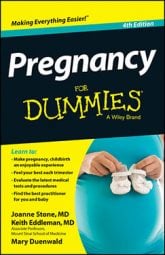Don’t worry. There's no conspiracy keeping you from knowing all there is to know about pregnancy. But your friends, sisters, cousins — whoever tells you what to expect with your pregnancy — often forget the little details, especially the more unpleasant ones. Furthermore, books often gloss over this stuff, perhaps in the interest of decorum.
Well, at the risk of being indecorous, here are ten things nobody else will tell you.
Pregnancy lasts longer than nine months
Pregnancy is said to last nine months, but that number isn’t exactly accurate. The average pregnancy lasts 280 days, or 40 weeks, starting from the date of the mother’s last menstrual period.
If a month is four weeks, that calculation comes out to ten months. On the calendar, however, most months contain four weeks plus two or three days, so nine calendar months often do contain close to 40 weeks. Practitioners speak in terms of weeks when measuring gestational age because it’s more accurate and less confusing.
Other people can drive you crazy
Friends, relatives, acquaintances, strangers, and even your partner give you unsolicited opinions and advice and want to share with you every pregnancy horror story they’ve ever heard. They may tell you your rear looks big, you’re too fat (or too thin), or you shouldn’t be eating whatever you’re putting in your mouth.
They don’t realize that they’re increasing your anxiety. Don’t pay attention. Try to politely smile and ignore them. Tell them you really don’t want to hear this story right now. If you have any real problems or concerns, talk them over with your practitioner.
You feel exhausted in the first trimester
You may already have heard that you’re going to feel tired during the first trimester, but until you go through it, you really have no idea how overwhelming the fatigue can be. You may find yourself looking for every possible opportunity to catch a few winks — on the bus, on the train, at work, or even on the exam table waiting for your practitioner to come into the room.
Rest assured this fatigue does go away, usually by the end of the first trimester (at about 13 weeks), and you do get your usual energy back. Look out, though. Around 30 to 34 weeks, the physical stress of pregnancy may overwhelm you again, and you may go back to feeling pretty washed out for several weeks.
Frequent naps, either in the first trimester or at any time, are always a good idea if you’re feeling tired.
Round ligament pain really hurts
The round ligaments run from the top of the uterus down into the labia. As the uterus grows, these ligaments stretch, and many women feel discomfort or pain on one or both sides of the groin area, especially at about 16 to 22 weeks.
Practitioners tell you this symptom is only round ligament pain and it’s nothing to worry about. And they’re right — don’t worry. But you deserve some sympathy because this pain can be fairly intense.
You can probably ease round ligament pain a bit by getting off your feet or changing positions, thereby taking the pressure off the ligaments. The good news is that round ligament pain usually diminishes by about 24 weeks.
Your belly becomes a hand magnet
After your stomach protrudes noticeably with pregnancy, you’re likely to find that suddenly everyone presumes touching it is okay — not only your friends, family members, and the people you work with, but also the mailman, the cashier at the supermarket, and other people you’ve never even met.
Hemorrhoids are a royal pain in the butt
Your best friend may say she’s told you everything about her own pregnancy. But did she mention her hemorrhoids? Hemorrhoids happen pretty often, and when they do, you’re in for some very noticeable pain and discomfort.
Hemorrhoids are dilated veins near the rectum that become engorged because of the pressure on that part of the body or because of pushing during delivery. Some women notice hemorrhoids during pregnancy, others don’t have any problem with them until after delivery, and some very lucky women never have them at all.
Most hemorrhoids go away within a few weeks.
Sometimes women poop while pushing
Pooping while pushing doesn’t happen every time; however, it’s fairly common. In all likelihood, you and your partner aren’t even aware of it happening because your nurse quickly wipes away any mess and keeps you clean throughout the pushing process. In fact, pooping while pushing is actually a good sign, because it means you are pushing effectively — and getting closer to baby time!
The weight stays on after the baby comes out
Most women can’t wait to weigh themselves after delivering 10 pounds or so of baby, placenta, and fluid. Contain yourself.
Wait at least a week. After delivery, many women swell up like dumplings, especially their hands and feet. This extra water retention adds pounds. If you step on the scale right away, you may be very disappointed at the number that comes up. The swelling generally takes about a week or two to go away.
Postpartum bonding really does happen
Some women worry because they haven’t felt attached or bonded to their fetus during pregnancy. After you deliver, within 24 hours, an overwhelming sense of love, devotion, and responsibility will happen for the majority of women. If this doesn’t happen, speak with your provider to make sure that you aren’t developing the postpartum “blues” or postpartum depression.
Breast engorgement really sucks
Of course you know your breasts fill up with milk after you deliver your baby. But what you may not have heard is how painful and cumbersome this engorgement can be if you aren’t breast-feeding, or when you decide to stop breast-feeding. Your breasts may become rock-hard, tender, and warm, and they may seem to grow to the size of blimps.
Fortunately, the discomfort is temporary; this intense period of engorgement lasts only a couple of days.

